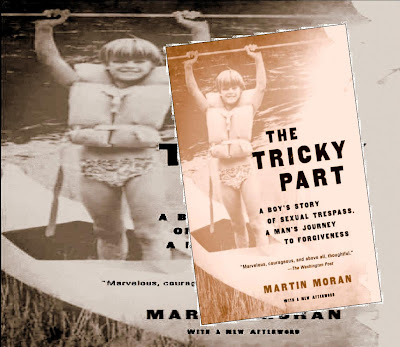
a Confession of Martin moran childhood life.
To everyone else in the Denver neighborhood where he grew up in the '70s,
Moran was a studious Catholic boy. No one knew he carried a secret that
would fester for 30 years and lead to extreme anxiety,
sexual compulsion and suicide attempts.
At age 12 he met Bob, a church camp counselor in his 30s who,
for several years, took Moran hiking and camping, and had sex with him.
Moran painfully recounts the inner workings of a lonely,
insecure adolescent who, out of a desperate need for friendship and acceptance,
continued a sexual relationship with a man 20 years his senior.

Feeling guilty and shameful regarding the affair and his homosexuality,
Moran lived a life in which the erotic and the illicit fused,
and compulsive sex became a means of self-punishment.
Over the years, Moran, now a writer and actor, managed to glean bits of
guidance and self-acceptance from his aunt, a contemplative nun;
a New Age music teacher; friends; and eventually,
recovery groups and therapy. Moran's Catholic-American gothic
differs from other abuse/recovery/coming-out memoirs in that it
examines a uniquely gay mind/body split as it subtly reflects on
a gay man's spiritual quest for self-determination and love.
=====================

Moran, now 42, gives a compelling account of his seduction, at age 12,
by a counselor at his Catholic church camp,
and their ensuing three-year relationship.
He describes his gradual addiction to the sex itself,
with no love attached, which he still sees repeated in his brief liaisons
in parks and restrooms, despite 15 years with his partner, Henry.
He remembers enjoying the concealment from friends and parents
of his involvement with Bob, 20 years his senior.
He recounts how he descended from "the top of the Catholic heap" in junior high
to thoughts of suicide when he felt that his deeds
"stuck to [him] like a bad smell." Moran discovers acting,

then joins a men's support group for survivors of sexual abuse, and is amazed at "how much energy it takes in the present to continually dismiss the past." His is a poignant and provocative memoir that delves behind the titillating headlines to reveal what's really at stake when children are sexually abused by authority figures.
=====================
No comments:
Post a Comment
There was never a good biography of a good novelist. There couldn't be. He is too many people if he's any good. To understand reality is not the same as to know about outward events. It is to perceive the essential nature of things. The best-informed man is not necessarily the wisest. Indeed there is a danger that precisely in the multiplicity of his knowledge he will lose sight of what is essential.
Thanks for your comment